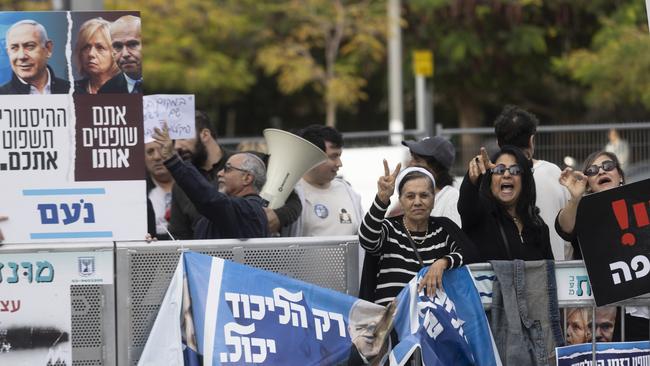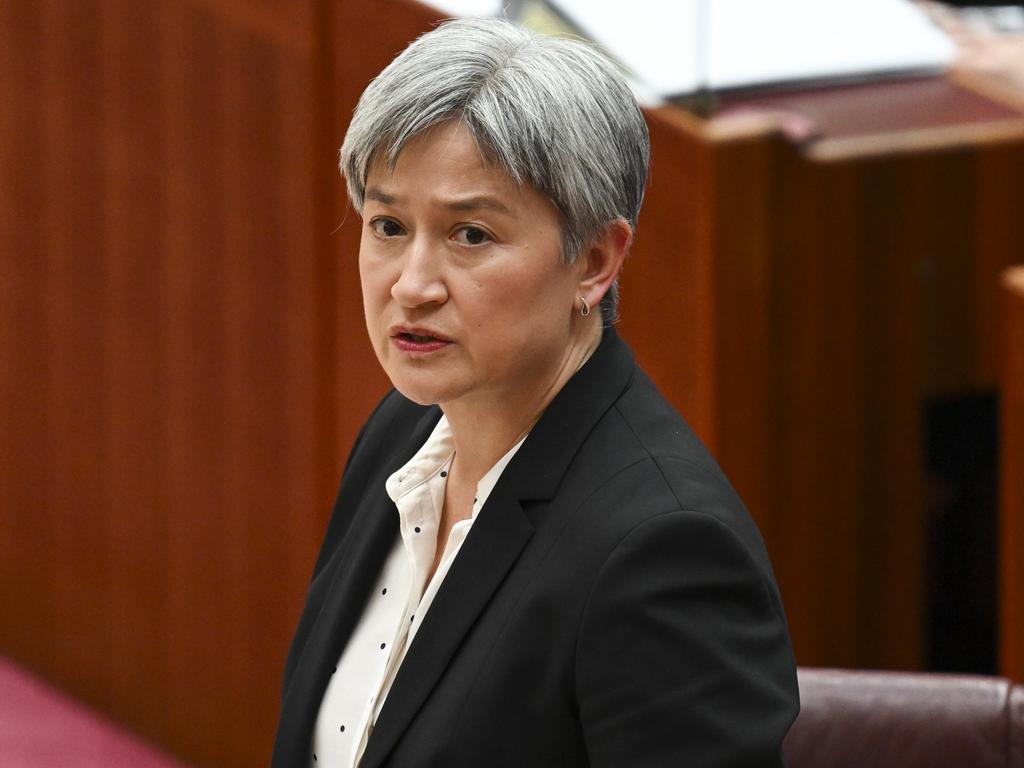Corruption charges ‘ocean of absurdity’ Benjamin Netanyahu tells trial
Benjamin Netanyahu has told a court trying him for corruption and bribery he gets no kick from champagne as he becomes the first sitting Israeli PM to testify in a criminal trial.
Benjamin Netanyahu has claimed in a long-delayed corruption trial that he hated champagne and, while he did smoke cigars, he rarely finished them due to his work commitments.
After five years facing charges of bribery, fraud and breach of trust in public office, Mr Netanyahu has begun giving evidence at a court in Tel Aviv, thereby becoming Israel’s first sitting prime minister to testify in a criminal case.
Mr Netanyahu, 75, is accused of accepting tens of thousands of dollars’ worth of cigars and champagne from a Hollywood producer in return for favours, among other allegations.
“I work 17, 18 hours a day,” he said. “Everyone who knows me knows this. That’s how I work. I eat my meals at my work table. It’s not cordon bleu. It’s not waiters coming with white gloves.”
He added: “If only I could steal away five minutes to enjoy some time with my wife.”
Describing the allegations against him as an “ocean of absurdity”, he told the court: “I have waited eight years for this moment, to say the truth as I remember it, which is important for justice.”
The Israeli leader is being tried on three separate cases that revolve around claims he arranged favours for tycoons in exchange for sympathetic media coverage and extravagant gifts, including crates of champagne, cigars and jewellery worth more than £100,000.

The trial, which began in 2020, has been beset by delays as the defence sought repeatedly to postpone proceedings, citing the security situation stemming from Israel’s involvement in a multi-front conflict.
Mr Netanyahu denies all charges and during a fiery press conference on Monday night described the case against him as a “brutal witch-hunt”. He said: “There was no crime, so they looked for a crime. They didn’t find a crime, so they concocted a crime.”
On the recommendation of Shin Bet, Israel’s internal intelligence apparatus, the trial has been moved from Jerusalem, where it had been taking place, to an underground bunker beneath Tel Aviv district court for security reasons.
Mr Netanyahu appeared relaxed as he arrived at court, smiling while he consulted with his legal team before the hearing began.
Beginning his evidence, the prime minister displayed all the skills of an experienced rhetorician, gesticulating freely and varying his tone between declamation and wry asides.
The judges agreed that he should be allowed to receive notes while testifying to help ensure he could continue running the country, and the hearing was at one point adjourned for five minutes after his lawyers requested an urgent break.
Mr Netanyahu repeatedly highlighted the many geopolitical dangers facing the country, contrasting them with the corruption allegations which he described as “a drop in the ocean”.
He spoke at length about Israel’s relations with Iran, the Palestinian territories and the United States, and noted some of his achievements. The judges later asked his barrister to keep his line of questioning on topic.
He told the court that he used to lose sleep over the media’s coverage of him but later became unconcerned, contrary to the prosecution’s presentation of him as image-obsessed.
Among those sandwiched into the cramped courtroom were supporters including Itamar Ben-Gvir, the hardline national security minister, as well as Knesset members for Mr Netanyahu’s Likud party.
While Amit Hadad, Mr Netanyahu’s barrister, was giving his opening statement, Tally Gotliv, a Likud member and noted firebrand, called out to tell the prosecution not to interrupt him.
“Ma’am, please refrain from making comments from the audience,” the judge warned her. Correcting the judge, Ms Gotliv responded: “Member of Knesset Tally Gotliv.”
Dozens of people gathered outside the court, some protesting against Mr Netanyahu, including family members of some of the hostages held in Gaza, as well as a group of his supporters. A banner draped in front of the court read: “Crime Minister.”
The prime minister will be questioned by his defence team and then cross-examined by the prosecution over three cases, known as cases 1,000, 2,000 and 4,000. He was cleared in a fourth case, 3,000, which concerned the government’s procurement of German-made submarines. Mr Netanyahu’s wife, Sara, is also said to have received gifts, though she is not a defendant.
The charges carry a maximum sentence of ten years’ imprisonment. Israel’s legal system is famously sluggish and a verdict is not expected until 2026 at the earliest. If he is found guilty of any of the charges, Mr Netanyahu might choose to appeal, a process which would itself take years to conclude.
The Times





To join the conversation, please log in. Don't have an account? Register
Join the conversation, you are commenting as Logout